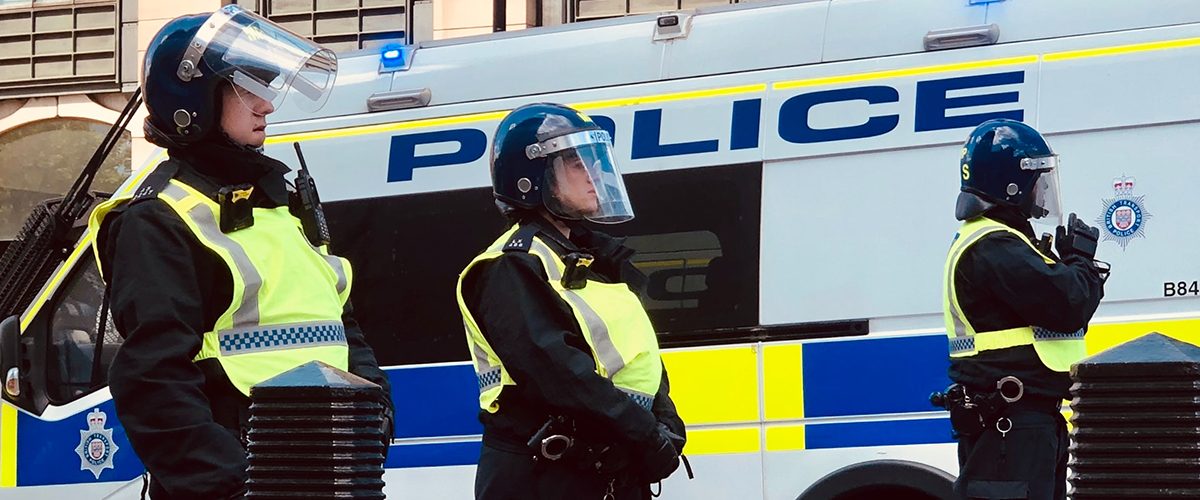The second time I was stopped in the street for questioning by the police, was not an ordeal.
It was a bright spring morning. I was walking away from Bolton town centre, on my way to teach a class at the Chadwick campus of Bolton Institute of Higher Education.
All at once, there was a screech of brakes and three police cars – one unmarked – swerved over to the pavement alongside me. The driver of the unmarked car was so eager, his front wheels bumped up onto the pavement.
A plain clothes officer leapt out of this car and, politely, asked me to step to the side because he needed to ask me some questions. I asked what it was about. A man had just carried out a robbery in Marks and Spencer and I ‘matched the description’. With this explained, I answered his questions. He listened, checked a couple of details on his radio, then stepped back, apologised for troubling me, thanked me for my cooperation and let me go. I think we both had a little chuckle about it.
It seems the principle way in which I ‘matched the description’ was that we were both holding a heavily laden Marks and Spencer carrier bag ¬– mine held my lecture notes, his contained a large wad of banknotes, snatched from an M&S till.
I shared this story with my students. They liked it better than my lecture.
The first time I was stopped by the police, was an altogether different matter.
It was a mid-summer evening and I was walking home after a long, difficult, sad meeting with my ex in a town centre pub. I walked through the subway down by the side of the Parish church. I could see a woman, standing at the far end of the underpass, silhouetted against the evening sky. Only when I got closer did it become clear she was a WPC.
She stopped me, told me to wait there and spoke into her radio:
“I’ve got him.”
Moments later, a male police officer appeared, having apparently followed me at a distance through the underpass.
By this point, the WPC had already tried to search me. I refused her permission to go through my pockets, but agreed to empty them myself.
The street wasn’t busy, but there were people walking past. I didn’t look at them but I knew, if any of them recognised me, they would mark me down as a criminal. The policewoman accused me of ‘being hostile’. It wasn’t hostility, it was humiliation.
My request to know why I’d been apprehended was ignored. The male officer asked for my name and address. His eyes lit up when I told him the latter. Temporarily, I was back living at my parents’ home – Hollycroft Avenue, Darcy Lever.
“Have you ever been in trouble, Martin?” He already knew the answer to this.
“No.” That was not the answer he “knew”.
“Really?” There was no attempt to disguise the incredulous tone.
Again, I asked why I had been stopped. Records searches took longer in those days so, almost to pass the time, they told me.
A woman had reported that, for about half-an-hour, a man “matching” my description, had been pestering people, trying to sell them drugs.
Simple solution, so I thought. I explained that, until about five minutes earlier, I’d been in a town centre bar (one of the newer, trendier ones, not a den of thieves). We could drive over in their squad car and somebody behind the bar would vouch for me.
No takers.
The radio crackled. The search had revealed no criminal record. Incredible.
They had little choice but to let me go, “guilty” though I was. The WPC left me in no doubt that I hadn’t conned her.
“There was obviously something about your behaviour that the lady didn’t like. Now, be on your way!”
This incident not only changed the way I felt about the police, it changed the way I felt about the country I grew up in. For quite some time, whenever I heard that glib phrase, “It’s a free country,” I could feel my hackles rising.
A few years further back, a lad called Paul, who lived in the next street, Beechcroft Avenue, told me about passing some other Darcy boys, just as they were being arrested. It was late and Paul was walking home alone, after a night’s clubbing.
One of the policemen shouted at Paul to come over. Paul, who hadn’t been with the other lads, protested.
“I haven’t done anything,” he told the officers. They grabbed him, thumped him on the side of the head and threw him the back of the van with the others.
He was charged with resisting arrest. He was now a lawbreaker. QED.
The first car my youngest brother, Matthew, ever bought was a Ford Capri. To be honest, the bodywork was in better nick than what lay underneath, but it looked good and he was proud of it.
Not long after he bought it, he was driving out of our street when the police pulled him over and gave him what’s known as a ‘producer’. In this context, a ‘producer’ (for those who’ve never had one) is a legal notice, issued by a police officer, instructing the driver of a vehicle to ‘produce’ their documentation (licence, insurance certificate, MOT) for examination at a local police station (within 7 days of issue).
A short while later, Matt got another producer. And then another, and another. In the end, he started ignoring them. This, of course, earned him a fine. He was now a lawbreaker. QED.
I was a highly educated man in my mid-30s; Paul was a smartly dressed young man in his mid-20s. Matt was barely out of his teens, driving a nice (well, nice-looking) car.
What marked us out, was that we all lived on one of two streets in a certain part of Bolton. We’d been socially profiled, you might say. White lads from a poor area; had we lived in certain other parts of town, we’d have passed without let or hindrance.
But here’s the thing. When you’re black, you’re black in every part of town.
#BlackLivesMatter




